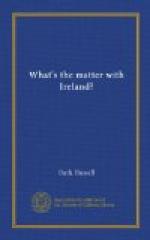Relief, the republic has said, must come through Sinn Fein—ourselves. Neither the Sinn Fein leaders nor the people believe in the power of the Irish vote in the British House of Commons. At the last general elections the Sinn Fein party pledged that if its members were elected they would not go to the British parliament, but would remain at home to form the Irish parliament, the governing body of the Irish republic. Dodgers explaining why Sinn Fein had decided to forego the House of Commons were widely distributed. These read: “What good has parliamentarianism been? For thirty-three years England has been considering Home Rule while Irish members pleaded for it. But in three weeks the English parliament passed a conscriptive act for Ireland, though the Irish party was solid against it.” On this platform, Sinn Fein won seventy-three out of 105 seats.
If Sinn Fein is to relieve the social conditions in Ireland, it must, say Sinn Feiners, find out the cause. So they have pondered on this question: What is the cause of the unemployment in Ireland today? The answer to that question was the one point that the sharp-mustached, sardonic little Arthur Griffith, founder of Sinn Fein, wanted the American delegates from the Philadelphia Race Convention to carry back to America.
It was revealed at a meeting of the Irish parliament specially called for the delegates. Cards were difficult to get for that meeting, and as each one passed through the long dreary ante-room of the circular assembly hall of the Mansion House, he was subjected to close scrutiny by the two dozen Irish volunteers on guard. In the civilian audience there was a sprinkling of American and Australian officers. Up on the platform was the throne of the Lord Mayor, in front of which sat the delegates—Frank Walsh, Edward F. Dunne, and Michael Ryan. In a roped-off semi-circle below the platform were deep upholstered chairs wherein rested the members of the Irish parliament. Countess Markewicz was, of course, the only woman there. White-haired, trembling-handed Laurence Ginnel, who is given long jail terms because he refuses to take his hat off in a British court, sat forward on his chair. The rich young Protestant named Robert Barton regarded the crowd through his shining eyeglasses. Keen, boyish Michael Collins, minister of finance, fingered the paper he was going to read. The last two men had recently escaped from prison and were wanted by the police—both, as they say in Ireland, were “on the run.”
“England kills Irish industry,” said the succinct Arthur Griffith as he rose from the right hand of DeValera to address the delegates. “Early in the nineteenth century, England wanted a cheap meat supply center. She therefore made it more profitable for the landowners in Ireland to grow cattle instead of crops. Only a few herders are required in cattle care. So literally millions of Irish, tillers of the soil and millers of grain, were thrown out of employment, and from 1841 to 1911 the population fell from 8,000,000 to 4,400,000. Today, Ireland, capable of supporting 16,000,000, cannot maintain 4,000,000."[2]




